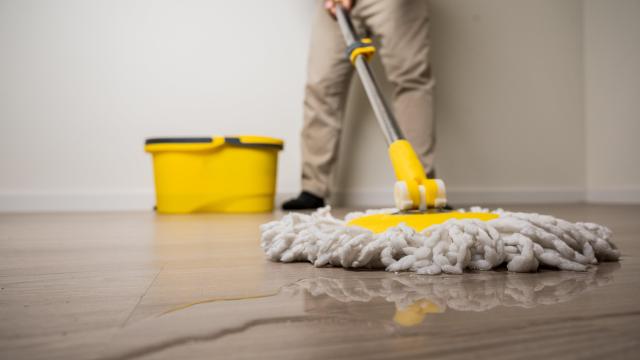The concept of finding a hack that makes your life easier or cheaper is especially tempting when it comes to cleaning your house—and TikTok is full of such advice. But many of the cleaning “hacks” you find there feature superficial results, basic misinformation or disinformation, and the sad state of STEM education in this country. For example, here are some popular cleaning hacks you might come across on social media that don’t actually work.
Mop with boiling water
If you hang around CleanTok long enough, eventually someone will instruct you to use boiling water when you mop your floors. On the surface, this makes sense: We boil water to make it safe to drink and to disinfect things, so why wouldn’t it work on your floors?
Well, mainly because your floor wasn’t designed to withstand the heat of boiling water. Sealed hardwood floors will swell and buckle if you do this, and vinyl and even some laminate flooring will come loose as the glue holding them in place breaks down. Worst of all, the damage may not show up immediately, so you can go a long time serenely ruining your floors before you enter your “find out” phase of cleaning hackery.
Using aspirin for whiter clothes
Apparently some folks still live in abject fear of being judged by how dingy their whites are, and spend a lot of mental and physical effort trying to brighten them up. In your search for easy hacks to make your whites blindingly bright, you’ll come across videos like this one that suggest grinding up some aspirin tablets and dropping them into the laundry to brighten your whites dramatically.
Aside from being one of those hacks that actually makes your life harder—because now you’re grinding up pills by the dozen instead of pouring a measure of bleach into your washing machine—it simply doesn’t work. Or, better said, it doesn’t work well. Aspirin breaks down into salicylic acid when exposed to water, and salicylic acid has some relatively minor detergent properties—but almost zero bleaching properties. Go home, internet, you’re drunk.
Cleaning the toilet with a Magic Eraser
Cleaning the toilet is a task no one wants to do. So it’s easy to understand that when some guru tells you that you can keep your toilet bowl perfectly clean simply by dropping a Magic Eraser into the tank to soak, you’re all ears. You’ll never have to gag as you scrub that bowl again!
Yeah, it doesn’t work. It literally doesn’t do anything, in fact, because Magic Erasers don’t contain any detergents or cleaning agents at all (unless specifically marked otherwise). They clean using what’s called “mechanical action,” i.e., scrubbing.
Cleaning with cola
Yes, colas are pretty acidic, and as a result they will have some impact on dirt and stains. However, they’re also filled with sugar and will leave a sticky residue behind, they will leave any glass or shined surface streaked and blurred, and they have exactly zero germ-killing power. It’s not totally useless, but why in the world this is better than just buying some cleaning products formulated to clean, sanitize, and vanish without a trace is a mystery.
Putting lemons in laundry and dishwashers
Like cola, many folks on TikTok and other social media platforms sing the praises of lemons as cleaning agents because of their acidity (and their delightful scent, which we’ve been trained to associate with cleanliness). And there’s some validity to this as well, because that citric acid is a decent solvent when it comes to dirt—so in theory, dropping a lemon wedge into your dishwasher or some lemon juice into your laundry will work just fine. But in practice it doesn’t seem to work all that well.
The problem is really one of volume: You need about 1/2 cup of lemon juice to have any impact, and a lemon contains just one tablespoon of juice. You’ll need about eight lemons to get that much juice, and now you’re juicing lemons instead of just using detergent like a normal.
Paper towels for Tupperware stains
No matter how we try to avoid it, our plastic food storage containers eventually take on those baked-in orange stains that make them look unsanitary even when they’re clean. The internet will tell you that your urge to bury them in the backyard and buy new ones to purge your home of evil is misplaced: Just drop some dishwashing liquid, water, and a paper towel in there, shake vigorously, and those stains will be gone.
But as The Spruce points out, this probably only works on fresh stains from food you just prepared—old, set-in stains will laugh at your efforts. So while not a complete waste of your time, it’s not a magical hack that will save your Tupperware.

Leave a Reply
You must be logged in to post a comment.